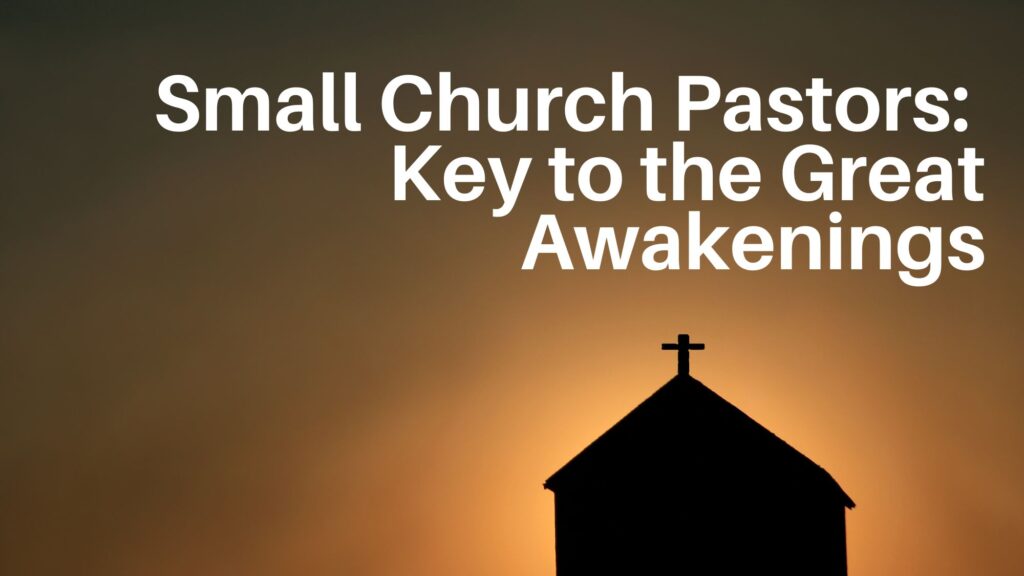
The role of small church pastors in the Great Awakenings in New England was pivotal. While much of the historical focus is often on prominent leaders like Jonathan Edwards or George Whitefield, the grassroots impact of small church pastors was essential in spreading the revival’s reach and embedding its transformative power into local communities. Here’s a deeper look:
1. Preparing the Soil for Revival
Small church pastors were often deeply connected to their congregations, both spiritually and socially. They faithfully preached the Word, cared for their flocks, and cultivated a sense of spiritual hunger long before revival swept through. Many of these pastors laid the groundwork for revival by:
- Regularly preaching on repentance, salvation, and the sovereignty of God.
- Encouraging practices like prayer meetings and personal Bible study, which softened hearts to the Holy Spirit’s movement.
- Teaching about the necessity of personal faith over formal religion, helping people see their need for a genuine encounter with Christ.
2. Local Revival Catalysts
During the Great Awakenings, revival often started in one area and then spread through neighboring towns and regions. Small church pastors were instrumental in this process by:
- Hosting revival meetings in their churches or fields, inviting itinerant evangelists like George Whitefield or others to preach.
- Supporting and amplifying the message of awakening, validating it as a work of the Spirit and encouraging their congregations to respond.
- Shepherding the revival locally by helping congregants process their spiritual experiences and guiding them toward lasting transformation, rather than mere emotionalism.
3. Guardians of Theological Depth
The revivals brought intense emotional responses, which sometimes led to confusion or spiritual excess. Small church pastors played a critical role in ensuring the revival remained biblically grounded by:
- Teaching sound doctrine to counteract false teachings or misunderstandings.
- Emphasizing discipleship, helping new converts grow in their faith and integrate into the life of the church.
- Writing letters, sermons, and treatises defending the revival’s work as genuinely of God, especially in the face of skepticism or criticism from more traditional clergy.
4. Building Revival Communities
The lasting fruit of the Great Awakenings didn’t just come from the large gatherings—it came from the ongoing work of local pastors who nurtured revival’s impact in their communities. They did this by:
- Organizing small groups, prayer circles, and Bible studies to sustain the spiritual energy of the revival.
- Training lay leaders and encouraging personal evangelism, expanding the reach of the Gospel beyond the church walls.
- Planting new churches in areas where the population grew spiritually hungry due to the revival.
5. Bridging Generational Gaps
Small church pastors were also key in connecting the revival to families and future generations. They often ministered in multi-generational congregations and helped ensure the revival’s fire didn’t burn out by:
- Teaching children and youth about the importance of personal faith.
- Modeling a lifestyle of prayer and devotion, inspiring future leaders.
- Encouraging families to create homes where Christ was central, embedding revival values into everyday life.
Examples in History
- Jonathan Parsons of Newburyport, Massachusetts, though less famous than Jonathan Edwards, welcomed George Whitefield and became a key local pastor promoting revival through preaching and mentoring.
- Many pastors worked tirelessly in small towns across Connecticut and Massachusetts, where the revival often sprang up in unexpected places. Their faithfulness ensured the movement didn’t remain a moment but became a legacy.
Modern Application
The work of small church pastors—faithfully preaching, praying, and discipling—is just as essential today as it was during the Great Awakenings. Revival often begins in the hearts of a few who are deeply committed to seeking God. As we lean into this rich history, perhaps God will use you and your church to ignite a fresh movement of His Spirit in this region.

